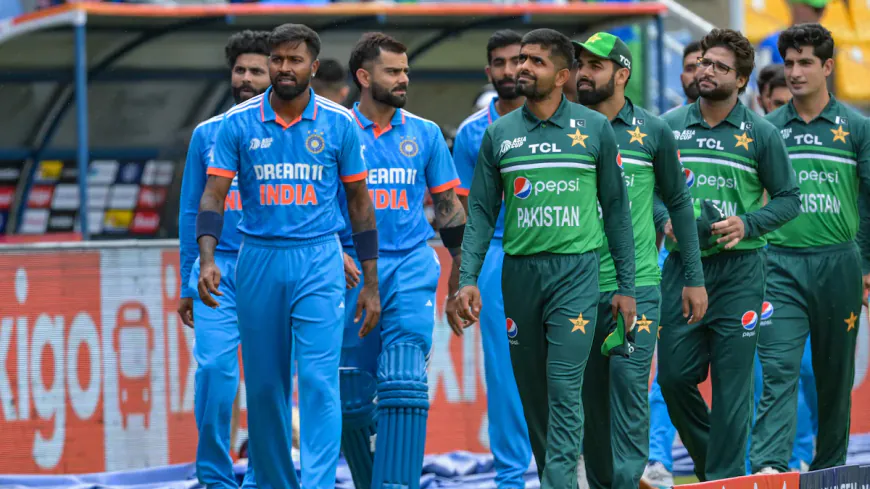India vs Pakistan Cricket Future in Doubt before ICC 2025 Conference
With the ICC Annual Conference 2025 drawing near, the future of India vs Pakistan cricket relations hangs in the balance as geopolitics and hybrid hosting models take center stage.

The future of India vs. Pakistan cricket series in ICC events has again been put in jeopardy with increasing tensions between the two nations. The terror attack in Pahalgam has again raised the issue of whether the two countries should keep playing against each other in international cricket events. The April 22 attack killed 26 tourists and has further deteriorated the already tense relationship between India and Pakistan. Following the attack, there is increasing speculation on what would happen at the upcoming ICC session to be held in Singapore from July 17 to 20.
India and Pakistan have never faced each other historically in bilateral series but have only faced each other in multi nation cricket tournaments like the ICC World Cup or the Asia Cup. India and Pakistan never play against each other in bilateral series due to political reasons. India and Pakistan have always been a regular presence in the same group in the ICC tournaments in the past decade to ensure high TV ratings. That may not be the case any longer. According to one BCCI source, while there is little chance that India and Pakistan will not face each other at all in ICC knockout tournaments there is a good chance that they will no longer be in the same group to begin with.
This change can be initiated as early as the next ICC T20 World Cup to be co-hosted by India and Sri Lanka. The hosts may decide to keep the two nations separated from each other in different groups so that there is no pre-mature clash. This is not merely a sporting decision but a politically sensitive one. The Board of Control for Cricket in India or BCCI always takes cues from the Indian government and the current attitude is very rigid especially in the aftermath of the recent Kashmir unrest. India holds Pakistan responsible for the Pahalgam attack and this attitude directly impacts cricketing ties between the two neighbors.
Interestingly the present ICC chairman is Jay Shah, the secretary of the BCCI. This will be his inaugural ICC annual conference as the chair since his assumption of office in December. With his dual role and the dominant BCCI grip over global cricket any decision arrived at this summit will be likely to be a reflection of India's security interests and diplomatic position. The BCCI has stated that it will be following the lines of the Indian government's position and currently it would appear that there is little room for maneuver.
Before this recent rise in tension there had been some success in aligning cricket matches between the two countries. The BCCI PCB and the ICC had already reached agreement on a hybrid model for India Pakistan matches to be followed until 2027. The model allowed both countries to participate in the same tournaments without hosting the other directly. This allowed a means of sidestepping direct political matters. But now it remains to be seen if this model will still be followed especially for the upcoming Women's World Cup in 2025 to be hosted in India.
The India Pakistan cricket rivalry is one of the most watched and passionate sporting rivalries in the world. Whenever these two teams clash millions of their fans around the world log in. The match is never just a match it is national pride history and a complex geopolitical relationship. Cricket fans wait for years to see these high pressure matches because they are only played during tournaments like the World Cup or Champions Trophy. The idea of these matches being removed from the group stages will certainly be a disappointment but safety and political concerns appear to be an utmost priority.
There is not much doubt that the ICC conference in Singapore will have some significant issues on its agenda. The biggest issue among them will be whether India and Pakistan have to continue to clash in the early stages of ICC tournaments. The tension following the terrorist attack and the military retaliation by both countries has made the situation extremely sensitive. If a decision is taken to keep the teams separated in group stages it could become a new trend in future events. That could diminish the immediate excitement of tournaments but it could also avert diplomatic issues.
The dominance of international cricket by BCCI cannot be overlooked. BCCI is the richest cricket board and brings in most of ICC's revenue. This makes India a prime driver in determining how international cricket is run. With the leadership of the ICC handed over to an Indian administrator the decisions at the next gathering will most likely be aligned with India's political and security perspective. This makes it highly likely that we will witness fewer direct India Pakistan confrontations unless they make it through the knockout stages of competitions. Supporters and commentators are already speculating about the probable implications of these events. Some believe that removing India and Pakistan matches from the group stages could affect TV viewing figures and sponsorship interest. Others believe security and peace must be the paramount consideration. One thing that is certain is that the dynamics between the two cricket boards and their Governments play a key role in deciding the destiny of one of cricket's fiercest rivalries. Throughout our discussion everyone's eyes are on the ICC conference in July. Until then the cricketing world will be left speculating if India and Pakistan will keep facing each other in international tournaments or if political tensions will again stop this classic rivalry from being relished on the field. Regardless of the result decisions made at this meeting will most probably influence international cricket for the next two years as well as the image of the Indo Pak rivalry.



 admin
admin